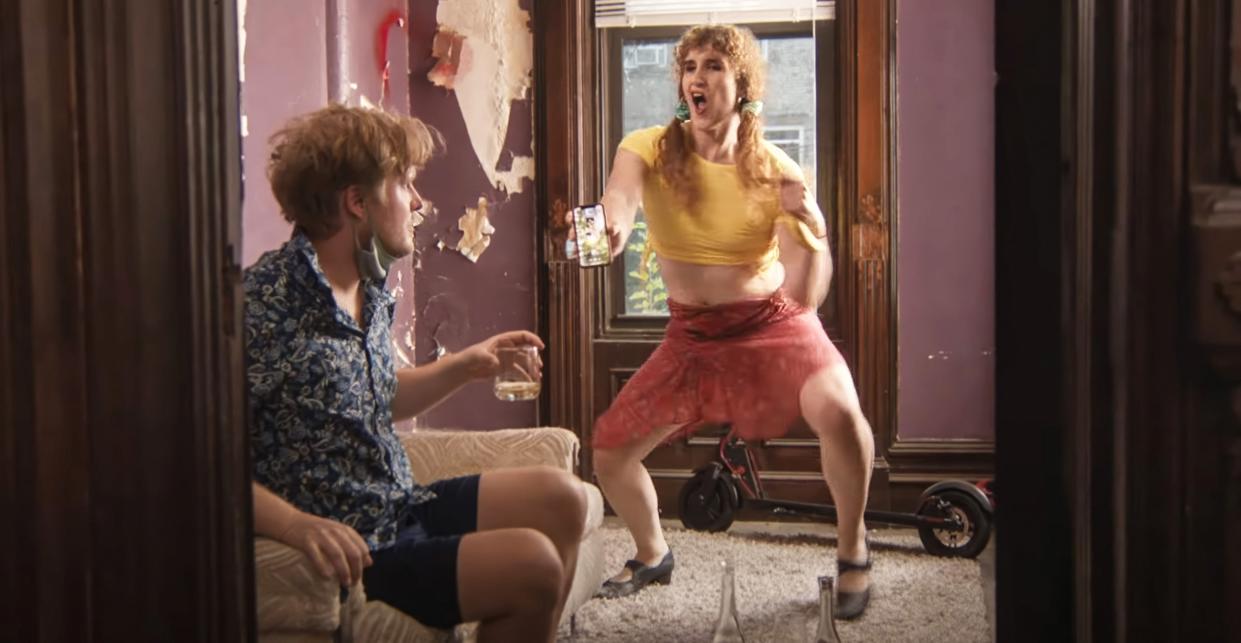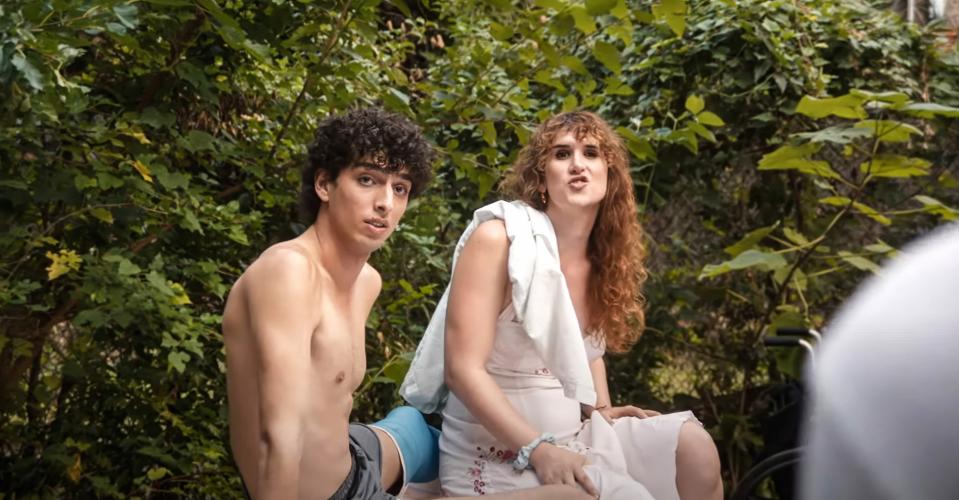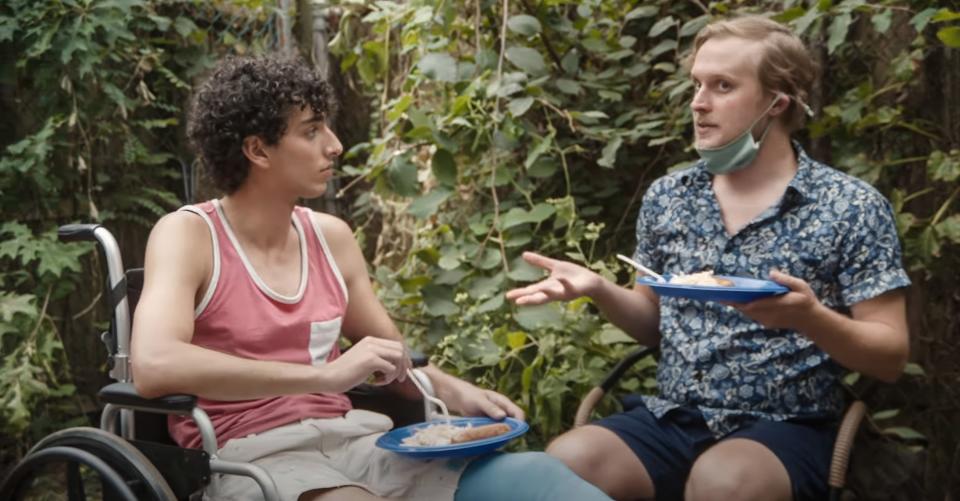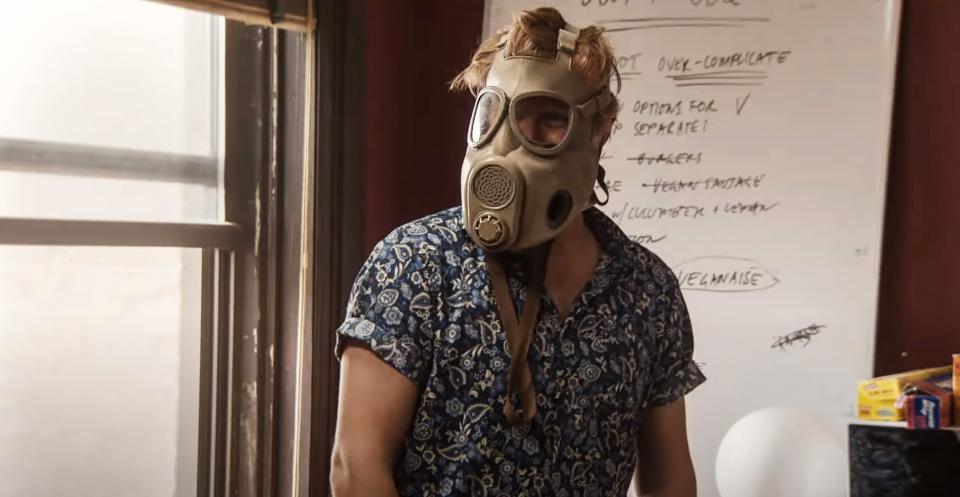Back Pain, Grubhub, and Lazy Liberals in Lockdown: John Early and Theda Hammel on the Screwball ‘Hell Mouth’ of Their Comedy ‘Stress Positions’

First-time feature director Theda Hammel looks straight into the sun of the COVID summer of 2020 — PPE, GrubHub, lazy liberal gesturing, and all — with “Stress Positions.”
The Brooklyn screwball comedy (Neon, April 16), set around the Fourth of July weekend that year, asks us to relive the days of sheltering in place and banging pots and pans in solidarity with healthcare workers while doing little else but navel-gazing at our own misfortune indoors. With a chatty ensemble led by John Early as Terry, a gaping wound of an idler reeling from a herniated disc and an ongoing breakup with his husband, “Stress Positions” sounds on paper like the coronavirus indie we’d like to ignore so as not to re-traumatize ourselves. But where many of the COVID-reacting films we saw spin out of 2020 were tethered to Zoom, “Stress Positions” goes straight into the “hell mouth” (Early’s words, in an IndieWire interview) of the moments lived off Zoom.
More from IndieWire
Lourdes Portillo, Maverick Filmmaker and Social Activist Who Elevated Mexican Stories, Dead at 80
'Rebel Moon - Part Two' Delivers Epic Battles - but Robot Jimmy Is the Scene Stealer
IndieWire spoke with Early and Thammel over, of course, Zoom, where the star and writer/director/star shared the same ebullient chemistry as they do onscreen, and that they did at the film’s 2024 Sundance premiere. In “Stress Positions,” Thammel plays Terry’s best friend Carla, a bodyworker self-deprecating about her own transness — which is in great contrast to Terry’s Gen Z nephew Bahlul (Qaher Harhash) from Morocco, convalescing at Terry’s brownstone from a broken leg and more brightly questioning his own gender identity. (Hammel co-wrote the film with Faheem Ali, who plays a Grubhub delivery person who introduces a new wrinkle into their lives.)
“Stress Positions” offers a heady lampoon of post-9/11 millennial faux social justice (Bahlul’s elders don’t even know where Morocco is on the map, but have plenty to say about its geopolitical position in the world) and queer appropriation (Carla’s girlfriend Vanessa stole her trans life story for Vanessa’s best-selling novel). But the movie is light on its feet and self-aware even amid long and generally deliberately misinformed dialogues about immigration, globalization, sexuality, and race. “Stress Positions” skewers the very language and gesturing we all affect in trying to broach the political maelstrom of identity politics, while also being a uniquely inclusive comedy on its own terms.
This interview has been condensed and edited for clarity.

IndieWire: Were you apprehensive about setting the movie in the COVID lockdown? “Stress Positions” is interrogating, I think, the sorts of lockdown indies we’re used to seeing at festivals since 2021, the type of movies audiences may want to avoid.
Theda Hammel: The best answer to that question may be that this movie was not written to be made. The fact that it was made came as a huge surprise to me and maybe to John. By the time the movie was in motion, I didn’t unfortunately have any time to rethink that. I haven’t seen every COVID movie ever made, but I’ve seen a few tendencies. There is the tendency for French movies, for example, shot during that period where people just happen to be wearing masks, and they go to school, and they’re wearing a mask, and they go home, and their mom is Juliette Binoche or something. There’s the other, more pitchy American-style movie like that Anne Hathaway movie [“Locked Down“] that was a couple deciding to do a heist during lockdown to save their ailing marriage. [‘Stress Positions’] isn’t really a pitchy movie. It’s just like, “Man falls apart while trying to cook food.” I was too naïve about the market [to think about it].
John Early: There was a really intense paranoia at that time, a kind of COVID paranoia that very quickly gave way to a social paranoia of voluntary mutual surveillance of everyone in terms of their COVID practices, but also in terms of their kind of political stances, their language. As you said [with other movies out of COVID], the stereotype was kind of about a relationship on Zoom. We seemed to all be going through something so major, and none of the kind of art of that moment seemed to really be going directly into the hell mouth of what we were actually feeling. And I thought Theda’s movie did a good job of, even just on a script level, capturing that existential terror. That felt new to me.

The particulars of lockdown become more an ambient noise, like the banging of pots and pans for frontline workers, which turned into an empty gesture by a certain point in summer 2020.
Hammel: That’s the perfect liberal solution in the sense that we are not going to stop ordering food to our houses. We’re going to make a lot of noise literally out the window. We’re going to stick ourselves out the window and make a lot of noise about how grateful we are for these people who were paying very substandard wages to go out in a pandemic and bring us French fries.
There’s a great line in the movie when Bahlul asks Carla why she transitioned, and she says something like, “I wanted to kill myself, and this helped.”
Hammel: Bahlul says, “But you felt like a woman inside,” and she says, “I wanted to kill myself, and this sort of helped.” I do think that’s broadly true, including cis women. The big reveal with gender discourse over the past 15 years is that anybody looking inside themselves is maybe not feeling a positive “yes” with regard to any identity, that what they might be feeling is a “no.” Maybe trans feminine identity is a result of looking into oneself and going, “No, not that. Not maleness. Not gay maleness, not that, and if I have to be in this position for one more second, I’m going to kill myself,” and finding that transition does help. These aspects of femininity do help, and that that might constitute the essence of womanhood, that womanhood might not be looking within oneself and saying, “I feel this way.” It might be a negation. I may be getting too pretentious with it, but the way Carla says it is accurate to my experience.

John, you had back surgery just before filming the movie, which was written for you, and in which Terry is suffering back pain. How were you able to do all the physical comedy in your condition?
Early: And it is a condition, and thank you! I’m going to use IndieWire to talk about that. Herniation awareness! It was a blessing and a curse, my back issues. Back issues are very fascinating and there’s obviously a very large psychological component to them that makes for the exact kind of character I want to play. There’s absolutely something of me in those kinds of characters. Back-injury-based pratfall is so emblematic of Terry’s whole thing. I was thrilled but also terrified because I was fresh off back surgery, but we made it work. We had a stunt coordinator, and we had pads. Theda was very careful with me. I wanted to keep going, and Theda was like, “I think we got it.” It was very sweet. If I’m presented with the opportunity to do something physically funny, I will take it even if it puts me at risk.
Hammel: A back injury, which is something that John has, I have them as well, it’s good for this character in the sense that it’s such a serious, severe pain. It is so unsympathetic to the world. Nobody cares about anything less than they care about your back pain, and you could be in shrieking agony. It would be better if you had a limb missing or a horrible burn down your face, then people would feel for you. But when you say, “My back is in agony, I can’t move,” people go, “Well, OK, what are you doing later? We’re going out. What’s wrong with you?”
“Stress Positions” opens in select theaters from Neon April 19.
Best of IndieWire
The 28 Best True Crime Shows Streaming Now, from 'Under the Bridge' to 'The Vow'
The 10 Best Doppelganger Films, from 'Dead Ringers' to 'Vertigo'
The Best Cannibal Films of All Time: 'Silence of the Lambs,' 'Raw,' and More
Sign up for Indiewire's Newsletter. For the latest news, follow us on Facebook, Twitter, and Instagram.


